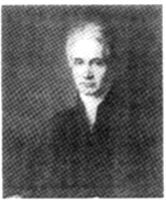


Chapter 5: Trinity College and Educational Reform

Bartholemew Lloyd FTCD FRS
The author, while being primarily a physicist in Carlow IT, has been working systematically in his marginal time on the history of science in Ireland snce 1971, in the interstices of his primary work on optical instrumentation.
This 31-page chapter traces the evolution of the teaching of science and technology in Trinity College from the beginning up to the end of the 19th century, linking it tentatively with the politics of the time. His Canadian perspective enables him to abstract from the confrontational aspects of Irish politics and link his treatment to the European mainstream.
The author makes the case that TCD has consistently played a pioneering role in the reform of university education in the UK as a whole. He begins with the example of Bartholemew Lloyd who introduced French mathematical notation in 1815, overthrowing what by then had become the 'dead hand of Newton', and risking being labelled as subversive in the political reaction of the time.
He then backtracks to the post Cromwell epoch, when Molyneux and Berkeley flourished, and the stage was set for a series of innovative steps in the teaching of science throughout the 18th century. The author claims that Stephen's Botanical Elements was the first ever dedicated student text-book on any science subject. There followed a series of teaching texts in all branches of science, which McMillan tabulates.
Similarly, Trinity College was the first to institute a systematic examination system as a means of qualification. These procedures were then subsequently used as a model for the 'red-brick' universities of the UK, which provided systematic quality-controlled utilitarian education to the rising middle-class professionals, including science and engineering.
Trinity College was also among the first to introduce Engineering, the first Professor being MacNeill who had served his time with Telford. The political dimension of this is explored, in that there was emerging an evolution towards a parallel Technical Education system via the RDS with Kane; McMillan sees the Trinity Engineering initiative as a sort of Tory pre-emptive move, motivated by the need to service the expanding British Empire, while Kane with his Industrial Resources of Ireland was promoting the interests of an embryonic Irish industrial bourgeoisie which later became the basis for the Home Rule movement.
McMillan goes on to outline the development of the TCD Medical School, led by Stokes and Haughton, and then later the development of Electrical Engineering under the influence of Fitzgerald, with the latter then becoming influential in the Dublin technical education area via his role on the Board of Kevin St College. Fitzgerald was instrumental in ensuring that the Engineering School had a well-designed scientific input, across its whole range. This chapter covers much ground, and outlines a significant agenda for future historians, whether motivated simply to 'prove McMillan wrong' or to follow up on his suggestions.
Some navigational notes: In most browsers, if you click on the 'Back' button, it will bring to to the point of departure in the document from which you came. Additional navigation options of local relevance are given at the foot of each page, thus:
[Top of Page] [Prometheus Contents ] [Tyndall Publications ] .